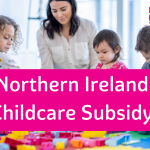What does the UK Spring Statement mean for families?
On the same day (Wednesday 23 March) as it was announced that UK inflation rates had hit a 30 year high of 6.2%, the Chancellor of the Exchequer Rishi Sunak delivered his Spring Statement, outlining his plans to build a stronger economy and stronger household finances, while reflecting on the war in Ukraine and the impact it has had on the cost of living here in the UK.
At a time when households are facing a real cost of living crisis due to rising costs for essentials like food and fuel, there was significant pressure on the Chancellor to reverse a planned increase to National Insurance Contributions (NIC) and to uprate benefits in line with the rising inflation rate. He did neither, instead focusing on a cut to fuel duty, raising the threshold at which workers start to pay National Insurance and announcing a 1p reduction in income tax, to come into effect from 2024. The general reaction to the Spring Statement has been that more could have been done to support those who are struggling now to make ends meet. Even the Government’s own fiscal watchdog, the Office for Budget Responsibility warns that living standards will fall at the fastest pace on record.
Summary
Some key points either announced or confirmed today:
- a rise in the National Living Wage to £9.50 per hour from April 2022 for those aged over 23
- National Insurance rising by 1.25 percentage points for the NHS Levy
- a cut in fuel duty by 5 pence per litre
- National Insurance threshold to rise in July to £12,570 aligning it with the Income Tax personal allowance.
There were no new measures announced to assist households who are in receipt of benefits with the rising cost of living, with Universal Credit and other benefits rising by 3.1% as announced back in October 2021, this is well below the current rate of inflation, which the Bank of England expects to rise above 8% this year.
Read the full detail on today’s Statement on the Government’s website: here.
It is important to note that some parts of the Spring Statement impact the whole of the UK while in other areas, such as the scrapping of VAT on home energy-saving measures, they do not affect Northern Ireland at this time. Where extra spending is announced on areas that affect England only, the devolved nations are allocated an equivalent sum of money using a formula known as the Barnett formula – it is up to Ministers in the devolved governments to decide how this money is allocated.
National Living and Minimum Wages
From April 2022 there will be an increase in the National Living and Minimum Wages across the UK. The National Living Wage will increase from £8.91 to £9.50 an hour.
The rates are set out below:
- £9.50 per hour for workers aged 23 years and over – National Living Wage
- £9.18 per hour for workers aged 21-22 years
- £6.83 per hour for workers aged 18-20 years
- £4.81 per hour for all workers under the age of 18, who are no longer of compulsory school age
- £4.81 per hour for apprentices under 19, or for first year apprentices aged 19 or over.
Additionally, many will be concerned about the impact of the increase in National Insurance which also is implemented from April 2022 for both employers and employees.
Increase in National Insurance Contributions
Despite coming under pressure to do so, the Chancellor didn’t cancel or postpone the planned 1.25 percentage points increase to employees’ and employers’ National Insurance Contributions, which had been announced in September 2021. This increase has been put in place to fund increased spending on health and social care. From April 2023 National Insurance will revert to its 2021-2022 level and in its place there will be a new separate 1.25% tax on earnings.
Increase in National Insurance threshold
While going ahead with the increase to NIC as planned, the Chancellor did announce that from July 2022 there will be an increase in the threshold at which employees start to pay National Insurance. The new earnings threshold, below which no NIC will be paid, will be £12,570. This aligns both the Income Tax and the National Insurance thresholds meaning most workers who pay NIC will now pay less and 2.2 million people will no longer have to pay National Insurance at all.
Cut in fuel duty
The effect of global circumstances including the war in Ukraine has pushed the price of fuel up to unprecedented levels. The announcement of a 5 pence per litre cut in fuel duty, although small, will be welcomed by motorists including parents driving their children to school; small businesses completing home deliveries; and hauliers that are critical to supply chains across the country. It must be noted however that the cut is temporary, lasting only for 12 months.
Universal Credit
Those who are working on a low income, are between jobs, looking for employment, or who are unable to work – for example those with a disability, some cancer patients, carers or parents of young children – will see benefit amounts rise by 3.1% as announced in the Autumn Budget 2021. The Chancellor’s decision not to increase this percentage uplift to an amount closer to the current rate of inflation means that many lower income families are seeing a real terms cut in their household income.
Leading think tank, the Resolution Foundation, estimates that the lack of support for low-income families in the Spring Statement leaves 1.3 million people, including 500,000 children, on the verge of “absolute poverty”.
Impact on the childcare sector
There will be challenges for many childcare providers in implementing these uplifts, both to the National Minimum Wage and to National Insurance, for example, within group childcare settings, where salaries account for a significant proportion of costs, this is likely to cause real concern about where funding will come from. This increase in salary costs will put further strain on a sector that is already struggling, and could result in an increase in fees for parents, when many are already experiencing a cost of living crisis due to the significant increases in other household costs, particularly energy. These increases are also being felt by providers who are seeing their own bills rising. It could also compound existing difficulties within the sector regarding the recruitment and retention of staff, and result in some providers having to cut the number of childcare places they can offer.
We are here to help you
If you would like to find out how the changes announced in the Spring Statement affect your family finances, get in touch with the Family Benefits Advice Service. We can help you work out what financial support you are entitled to. It’s free, impartial and confidential – call us on Freephone 0800 028 3008 or email hello@employersforchildcare.org.





